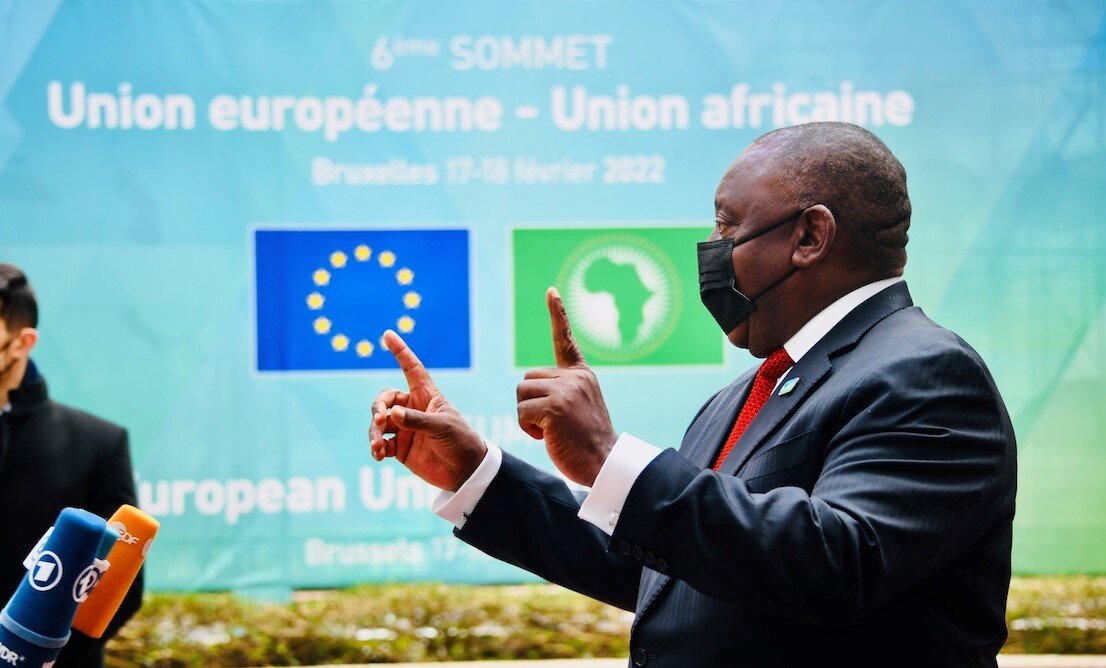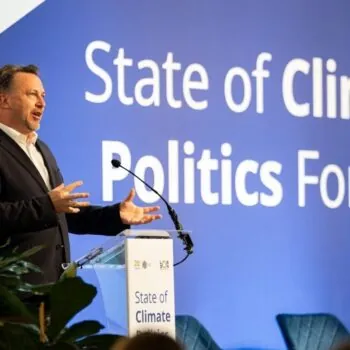With the African continent at the heart of the climate negotiations this year, the EU has set itself the task of reshaping its relationship with the African Union. Last week’s EU-AU Summit was the first opportunity to do so. While this contributed to strengthening relationships, the true test of success will be on EU’s ability to deliver on its political commitments by COP27.
Billed as a “unique opportunity to lay the foundations for a renewed and deeper AU-EU partnership”, the EU-AU Summit was a chance to rebuild trust by demonstrating that this partnership is of equals. On the climate front, success meant deeper recognition of the need to support Africa with climate impacts and indebtedness, a co-development of just transition and energy packages and developing resilient infrastructure.
Where climate featured prominently
- Energy transition: The AU referred to gas as an essential element for a just transition and electricity access across Africa, which remains a clear barrier for development. Given the centrality of development outcomes but disagreement around the role of fossil fuels, the EU and AU need to strengthen their partnership for a fair energy transition.
- Global Gateway: An investment package of at least EUR 150 billion to increase the resilience and sustainability of African economies was announced. However, financing details were not. Ensuring the initiative is of added value and targets African priorities will be key for its success.
- Special Drawing Rights: The declaration encourages EU countries to increase pledges to contribute to the global goal of at least USD 100 billion. So far, EU Member States have pledged USD 13 billion. They made no additional contribution during the summit. It was highlighted that the involvement of African institutions in the use of SDRs would be essential for the region’s recovery. However, the IMF suggests that SDRs cannot be channelled via regional development banks, showing further discussions will be needed to address this topic.
What was missing
- Climate risk and Loss & Damage (L&D): Africa is the most vulnerable continent to climate risk and is already facing the impacts of climate change. However, a joint approach on L&D was not part of the public statements. Excluding L&D from the Summit was a missed opportunity for more concrete cooperation to develop solutions, and for the EU to start delivering on its Glasgow promises.
- Joint Development of the external dimension of the Green Deal: The EU must show it can leverage its clean economy to support the development needs of its partners, but a reset is needed in the way it addresses climate, trade and development. This Summit showed that the EU is willing to work with partners to lay the basis for stronger cooperation. However, without the whole spectrum of economic and diplomatic measures implemented, delivery will be compromised.
- Follow-up and accountability mechanisms: Cooperation structures, as well as the follow-up mechanisms that were announced at the Summit, show political willingness for a renewed partnership. But they lacked clarity and detail on how it will be achieved. In this context, cooperating with CSOs is crucial if the EU is serious about delivering for people’s local needs. This is paramount for the Global Gateway to add value and work in line with the EU’s core values.
Next Steps for the EU
The EU-AU Summit was an opportunity to strengthen this partnership, but lacked concrete climate breakthroughs. The EU’s to-list for meaningful EU-AU collaboration in the run-up to COP27 in Sharm El-Sheik remains long.
- Implementation of the EU’s own climate targets: the EU needs to shift from announcements to implementation, fulfilling Glasgow climate promises to maintain international credibility. To keep 1.5 alive, all major economies need to deliver on their NDCs and raise ambition by COP27.
- Delivery of a concrete package on Adaptation and L&D: With COP27 being portrayed as the “African” COP, the EU will be judged on its delivery of the Glasgow promise to double adaption finance, as well as on the Glasgow Dialogue for L&D. Engaging constructively with African partners on specific solutions for these two topics will be crucial to showing the EU is taking its commitments seriously.
- Building offers of partnership for just energy transitions with AU countries: Delivering these partnerships is in the EU’s self-interest. It would send a strong signal that energy transition is also in Africa’s self-interest. Over the last two decades, only 2% of global renewable energy investment has happened in Africa. Global Gateway is an opportunity to shift investments from fossil fuels to renewable energy. France’s announcement of new partnerships with some African countries (Senegal, Egypt, Ivory Coast, Kenya and Morocco) needs a Team Europe approach. The EU’s upcoming International Energy Strategy must focus on putting clean energy at the centre of the broader energy, development and trade cooperation with Africa.



